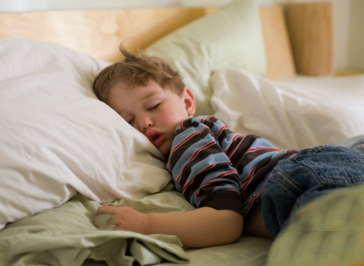Treat 'vinegar' in children
Bedwetting is a common problem in children. According to statistics, about 30% of 4-year-old children, 10% of 6-year-old children, 3% of 12-year-old children and 1% of 18-year-olds have this condition.
Bedwetting is common in boys and tends to be inherited in the family. If both parents have enuresis, they will have an 'opportunity' of up to 70% and will be 44% if only 1 of the 2 parents ever 'sipped'.
The cause of this condition is not yet known, the cause of cystitis accounts for only 1-2% of cases. Most children get rid of themselves when they grow up without any treatment.
Although this test ends on its own, it is very important if the effort to 'stop' it as soon as possible. This usually occurs when a child is being criticized or when he or she establishes new relationships with a newborn friend or sibling. These relationships greatly affect the child himself. If not resolved, enuresis can lead to self-deprecating and inconsistent behaviors.

Boys often bedwetting more than girls
Golden rules
1. Parents need to remember that 'vinegar' is a disease that needs treatment like the flu. When treating flu, we treat symptoms and the body needs to rest completely. This can also be used to treat bedwetting. Children need to be aware of this and understand that they are not unique, many other children have similar problems.
2. Children should never be banned or scolded when they 'wet' the bed. Children are unable to control their behavior and scolding will make them more anxious, making the situation worse.
3. Along with the treatment, it is also necessary to help children realize their responsibility for this. Help your child see problems from the bed and change new bed sheets together.
4. You can ignore the area drenched in the bed but never neglect the child (no change of clothes).
5. Never let children participate in activities that are too late, children need to go to bed early. You also need to protect children, not drag this story out to tell everyone. You can also give your own pajamas and sleeping bags . These will help children feel safe and understand that if there is an 'accident', no one will know and this will make the frequency of 'vinegar' matches decrease naturally.
6. Be patient! Children need time to improve the situation and not relapse.
7. Drug treatment is possible but not the only option. The best results are from a combination of encouragement and treatment.
- 10 extreme household cleaning tips or vinegar
- Eat poisoned banana vinegar?
- Vinegar - natural anti-fat
- Vinegar helps detect cervical cancer
- Detect cervical cancer using vinegar
- Apple cider vinegar helps prevent cardiovascular disease
- Health benefits of vinegar
- Middle child is often harder to treat kids
- Use of apple cider vinegar for pregnant women
- The power of absurdity
- Obese children are the most difficult to treat
- Treat children with a virtual world
 Green tea cleans teeth better than mouthwash?
Green tea cleans teeth better than mouthwash? Death kiss: This is why you should not let anyone kiss your baby's lips
Death kiss: This is why you should not let anyone kiss your baby's lips What is salmonellosis?
What is salmonellosis? Caution should be exercised when using aloe vera through eating and drinking
Caution should be exercised when using aloe vera through eating and drinking